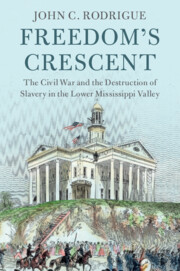Book contents
- Freedom’s Crescent
- Cambridge Studies on the American South
- Freedom’s Crescent
- Copyright page
- Dedication
- Epigraph
- Contents
- Figures
- Acknowledgments
- Abbreviations
- Additional material
- Introduction
- Prologue Life – and Labor – on the Mississippi
- Part I From War for Union to Military Emancipation, 1860–1862
- Part II From Military Emancipation to State Abolition, 1863
- 5 “The Return of the Seceded States to This Union as Slave States”
- 6 “Repugnant to the Spirit of the Age”
- 7 “The Greatest Question Ever Presented to Practical Statesmanship”
- 8 “The Name of ‘Slavery’”
- 9 “Repudiating the Emancipation Proclamation and Reestablishing Slavery”
- Part III Abolition: State and Federal, 1864
- Part IV The Destruction of Slavery, 1865
- Epilogue Memphis and New Orleans: May 1–3 and July 30, 1866
- Bibliography
- Index
6 - “Repugnant to the Spirit of the Age”
from Part II - From Military Emancipation to State Abolition, 1863
Published online by Cambridge University Press: 19 January 2023
- Freedom’s Crescent
- Cambridge Studies on the American South
- Freedom’s Crescent
- Copyright page
- Dedication
- Epigraph
- Contents
- Figures
- Acknowledgments
- Abbreviations
- Additional material
- Introduction
- Prologue Life – and Labor – on the Mississippi
- Part I From War for Union to Military Emancipation, 1860–1862
- Part II From Military Emancipation to State Abolition, 1863
- 5 “The Return of the Seceded States to This Union as Slave States”
- 6 “Repugnant to the Spirit of the Age”
- 7 “The Greatest Question Ever Presented to Practical Statesmanship”
- 8 “The Name of ‘Slavery’”
- 9 “Repudiating the Emancipation Proclamation and Reestablishing Slavery”
- Part III Abolition: State and Federal, 1864
- Part IV The Destruction of Slavery, 1865
- Epilogue Memphis and New Orleans: May 1–3 and July 30, 1866
- Bibliography
- Index
Summary
The success of the Federal military campaigns at Vicksburg and Port Hudson (Louisiana) give the Union control of the entire Mississippi River and alter the course of the war. The campaigns also bring about the first substantive combat experience of black soldiers in the war. Tennessee Unionists hold a convention in July 1863 that precipitates the split between free-state and conservative Unionists. In Louisiana, conservative Unionists petition Lincoln to recognize their efforts to organize a loyal, proslavery government, but Lincoln rejects the proposal. Free-state Unionists in Louisiana also develop plans for restoring the state predicated on abolishing slavery.
- Type
- Chapter
- Information
- Freedom's CrescentThe Civil War and the Destruction of Slavery in the Lower Mississippi Valley, pp. 132 - 144Publisher: Cambridge University PressPrint publication year: 2023

